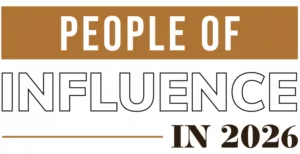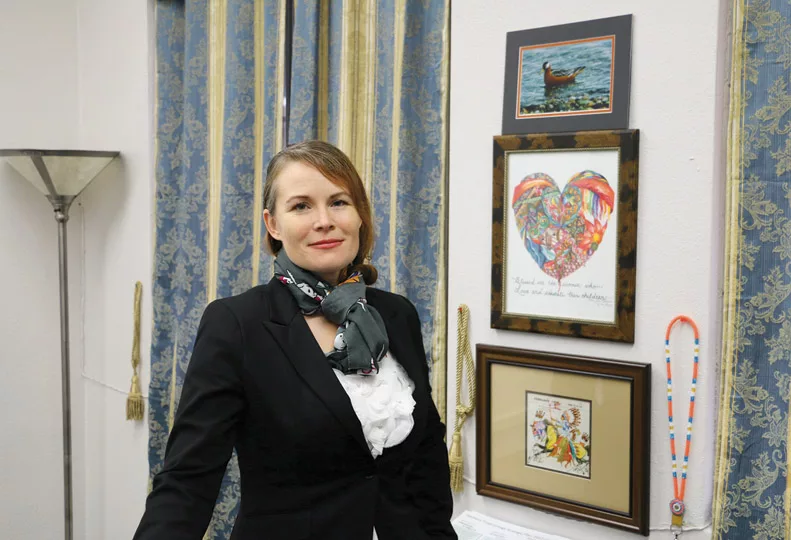
Home » Small tribal colleges sees enrollment, funding grow
Small tribal colleges sees enrollment, funding grow
School's curriculum strives to offer Native perspective

November 19, 2015
As one of only 37 tribal colleges in the U.S., Spokane Tribal College—which offers classes here and on the Spokane Indian Reservation, at Wellpinit, Wash.—says it’s continuing to grow, with increases in enrollment and its annual operating budget.
Director and CEO Shelly Wynecoop says that while enrollment for both locations has increased during the last few years, the Spokane branch in particular has seen a rise in admissions. The college reported a total of 39 students in 2013, which rose to 77 last year.
Wynecoop says the past few years have also given the college its largest graduating classes, albeit still tiny compared to traditional colleges.
“In both 2012 and 2014, we had nine graduates, and in 2013 we had six,” she says. So far this fall the college has 50 students enrolled, a number which Wynecoop says is likely to increase come winter quarter.
Spokane Tribal College is accredited under its parent institution, the Salish Kootenai College, of Pablo, Mont., through the Northwest Commission on Colleges and Universities. The college offers two-year associate degrees in liberal arts, Native American studies, business management, media design, and business technology. It also offers one-year certificates of completion in office professions, medial office clerk, and Native studies programs.
Wynecoop says Spokane Tribal College also has programs that interact with several other of the region’s tribes, such as the Kalispel and Colville Tribes, as well as with the Salish School of Spokane.
The college says on its website that the Spokane area is home to about 12,000 Native Americans from more than 80 tribes. While Spokane Tribal College was created to provide culturally appropriate higher education opportunities for Native American students, and many who attend are tribal—a large percentage being from the Spokane Tribe—the college accepts students of any heritage.
“As a tribal college, we’re required to maintain 51 percent Native enrollment,” says Wynecoop. “Right now, we’re probably 90 percent Native students.”
The college’s faculty is made up entirely of adjunct instructors, ranging from 23 to 30 each quarter. Wynecoop says the lack of full-time faculty hasn’t yet presented any problems with providing adequate instruction to students.
“Occasionally we might run into issues with starting new programs and needing to find instructors with a certain level of expertise, but so far it’s worked out OK,” she says.
“We also have an arrangement with the community colleges, so that when we need someone we can get the word out and dip into their adjunct pools.”
She says that during the last four years, the college has tripled its budget, working to diversify its sources of income. When Wynecoop started working with STC in 2011, the college’s operating budget was about $179,000. Since that time the budget has increased to around $600,000.
Wynecoop says that because Spokane Tribal College is a smaller college with fewer students enrolled, it receives only about 28 percent of the federal funding that other colleges receive.
“Federal funding is tied to enrollment, and while we’ve been doing better because of the increase, it’s still a challenge to find enough funding,” she says. “We get most of our funding through tuition, but we also hold fundraisers like the annual auction. This year we’ll be co-hosting that with the Salish School.”
Wynecoop says the college does receive some funding from the Spokane Tribe, both direct contributions and in-kind support, but she declined to disclose an exact percentage.
“We’ve been focusing more on private funding, grant writing, and strengthening our partnerships with other organizations to expand our student base,” says Wynecoop. “We’ve had some great community support and things have really turned around.”
The college’s main campus was established in 1995 on the Spokane Indian Reservation at Wellpinit, Wash., about 60 miles northwest of Spokane. By 2007, the college had begun offering courses in Spokane, operating out of Gonzaga University’s Schoenberg Center.
Having outgrown that space, the college moved into the Spokane Tribe of Indians Building at 1025 W. Indiana. It holds classes in three rooms on the building’s first floor, one of which also functions as a computer lab.
“The building belongs to the tribe, but we rent the space we use,” says Wynecoop. “We’re not an entity of the Spokane Tribe, although we are chartered by them.”
Wynecoop says because of its accreditation through the Salish Kootenai College, many students from Montana tribes and Canadian tribes are familiar with the school, having friends or family who’ve attended.
“There is a discount in tuition for tribal members and descendants,” says Wynecoop. “Many are also surprised to learn we waive tuition for enrolled tribal members who have completed their high school diploma or GED within the last three years.”
A year’s tuition and fees at Spokane Tribal College varies according to tribal enrollment and state of residence, ranging from $4,191 for an enrolled tribal member to $11,463 for an out-of-state, nontribal student.
Spokane Tribal College operates on a quarterly schedule, with rolling admissions. Wynecoop says the college tries to maintain an easy admissions process for potential students.
“We get all sorts of people who are interested in pursuing a college degree, but for one reason or another couldn’t envision themselves ever getting there,” she says. “We try to be responsive to their needs, helping them start classes as soon as possible.”
Wynecoop says many students are first-generation college students, working full time or caring for young children, and most of them go on after Spokane Tribal College to earn a four-year degree.
“We encourage parents to bring their children to classes if they need to,” she says. “We start by helping an individual meet their needs, but in the end, it strengthens the community. These students set an example for their children and others as they begin to find their voice and figure out how they can contribute.”
One of the college’s 2013 graduates, Randy Ramos, just finished an unsuccessful run for a seat on the Spokane City Council. Wynecoop says Ramos’ fellow alums were proud to see him go for it.
“It’s really great seeing how far he’s come, and to see the Native voice being represented,” she says.
Wynecoop says what makes Spokane Tribal College different in regard to the courses it offers isn’t what materials are taught, but rather how they’re taught.
“Some of what we teach is about understanding communication and presentation. Different cultures have different mannerisms and ways of interacting in various situations,” she says. “We also incorporate Native American history and experiences into our courses, while most other schools gloss over it or simply don’t include it. Many students come in having never been taught any of their history in schools they attended growing up.”
Wynecoop says Spokane Tribal College is working on offering an associate of science program in forestry.
“There is going to be a big demand for foresters, as many in the industry are older now and retiring,” she says. “Reservation forests are also a kind of specialty with a history all their own. This degree would incorporate study of how the management of these forests affects area cultures.”
So far Wynecoop says the most popular courses for each campus seem to be business management at Wellpinit and Native American studies in Spokane. “That’s been the usual trend for a while, although I suspect our forestry degree will be very popular when it becomes available,” she says.
Wynecoop is a descendant of the Spokane Tribe. Having grown up in Wellpinit, she attended high school in Reardan and went on to earn a bachelor’s degree in linguistics and language acquisition from Oberlin College, in Cleveland, Ohio. She completed post-baccalaureate research in cognitive science at Stanford University and earned a doctorate in cognitive psychology and psycholinguistics from the University of Chicago.
Latest News Up Close Education & Talent
Related Articles
Related Products


_web.webp?t=1764835652)
